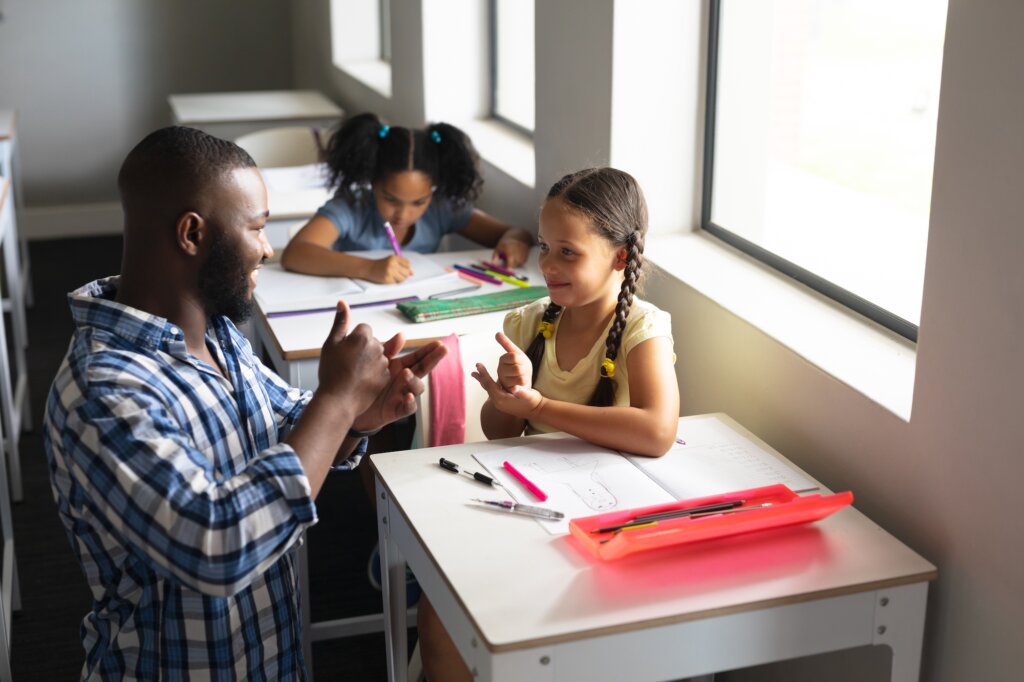Eight Tips for Coping with a Child's Disability


Reviewed and approved by the psychologist Sergio De Dios González
The arrival of a new member to the family imposes changes. Moreover, if they have any kind of condition, such changes are more momentous. Therefore, in this context, it’s common for doubts, uncertainty, and stress to appear when dealing with a child’s disability.
Once the diagnosis has been established, it isn’t easy to accept the news. In fact, as a rule, it breaks with a series of well-established expectations. It should be noted that no two cases are identical and each circumstance is different. Indeed, no family reacts in the same manner or with the same intensity. For instance, they may exhibit a delayed reaction or be more contained in the early stages of the diagnosis.
In addition, the environment adds pressure. In most situations, parents have freely expressed their feelings. Furthermore, data suggests that they almost always accept the outcomes. Along with this, comes a period of adaptation and management and the child usually grows up experiencing a good quality of life.
In this article, we’re going to suggest some tips that’ll help manage the diagnosis of a child’s disability and the resulting consequences.
Tips for dealing with a child’s disability
If you’re in this situation, to face your new family situation, you should put into practice the following recommendations.
1. Training and information generates confidence
When you possess solid information on an issue, you often feel more confident in taking action. The most reliable sources are the professionals dedicated to this field. They can tell you what’s happening to your child, why, and how to help them at each stage of their development.
[/atomik-in-text][atomik-in-text]For example, for children with reduced mobility, physical therapies that help them in areas such as muscle strength, flexibility, balance, and motor skills are important.
On the other hand, you must also keep in mind the legal aspects. In fact, all countries, nations, and communities tend to have their own rules or laws on disability. Knowing these will help you facilitate your child’s integration into society. Moreover, often, public bodies are obliged to make different resources available to you by way of financial and specialized support.
2. Get to know and attend support programs, care centers, and family associations
Many schools, educational institutions, town halls, and associations have programs aimed at parents and relatives of children with disabilities. They aim at promoting solidarity and empathy.
These programs are important at the training and educational level. In fact, they’re a fundamental tool. You’ll find professionals there who’ll advise you on the special needs of your child, documenting what you might and might not expect to happen.
In addition to institutional or external support, in many cases, the family is a differentiating element. For example, loved ones might build insurmountable obstacles, with their rejection, indifference, or intransigence. On the other hand, they can be the most valuable emotional support.
3. Inform their educational institutions
If their disability isn’t preventing your child from going to school in conditions similar to those of their peers, the role of the teaching staff is key. Make sure they participate and, if you can, put all the relevant information into their hands so they can take it into account. The more precise it is, the more personalized treatment they can give to your child.

4. Practice self-care
To make others happy, you have to be happy yourself. It’s the same with care. To take care of others, you have to take care of yourself. But, how do you start? You can begin by doing activities that you like: exercising, reading a book, seeing a friend, or taking a short break. After all, you often just need a moment to cry or vent your feelings.
These small acts often also open the door to feelings of optimism. You surely remember occasions when, by carrying out a certain activity, it changed your mood and you went from seeing everything in a negative to a positive light.
5. Go through your grief
If your child is disabled, you must face the loss of the ideal you had, and accept your child as they are now. If you feel that this situation has dashed your dreams, you’re grieving.
Although you might think that grief is only associated with the death of someone close to you, this isn’t the case. As the American psychiatrist Elisabeth Kübler-Ross affirmed, it can be related to anything that gives you a real feeling of loss. Therefore, it can happen when you find out about your child’s disability that you now must face.
It’s important to go through your grief. You must understand each stage and live through it.
- Denial. “There’s something not right. This can’t be happening to me.”
- Anger. “Why me? Why my child? And why my family? Are we being punished?”
- Bargaining. Accepting the new situation, although you’re still seeking answers.
- Sadness or depression. You understand that the scenario won’t change. This generates emptiness, rumination in thought, etc.
- Acceptance.
We must clarify that these stages don’t necessarily occur in an orderly manner. In fact, you might start with sadness, then move to anger, and finally negotiation. Coping with your child’s disability will require grieving, adapting to the new family situation, and restoring your emotional stability.
6. Attend psychological therapy
In psychotherapy, you’ll find an assisted context to manage the emotional storm that’s causing you so much anguish. Professional consultation is also a good way of taking care of yourself. In fact, it’s probably the best way.
Professionals can guide you and accompany you in your process of grief. Family or friends also play a relevant role, but they can’t provide you with the resources that a specialist will give you.

7. Try not to blame yourself
Guilt is a haunting emotion. It weighs heavily and you can’t always put up with it. When it comes to your child, you may feel that it’s your fault that your child has a problem, whether they be suffering from a mobility or intellectual disability.
It’s normal to feel guilty, even more so when you have a clear diagnosis (eg physical, hearing, speech, intellectual disability). But, you shouldn’t blame yourself.
Remember that there are many different factors that could’ve had an influence. For instance, prenatal (before the child was born), perinatal (during childbirth), and postnatal (after the child was born). In fact, as a rule, these causes originate at different times and for different reasons. Sometimes, it’s just a random situation. One example might be a hearing impairment that could’ve occurred for the following reasons:
- Genetic causes: Not everyone recognizes family diseases, especially since they can originate from the great-grandparents’ generation. Indeed, we might know about hereditary diseases from our parents, but not always those that existed before them.
- Complications in childbirth. According to the World Health Organization, around 830 women die every day from causes linked to pregnancy and childbirth. No one is exempt from it happening, nor are they guilty of anything.
- Certain infectious diseases. For example, chronic otitis, exposure to loud sounds, use of ototoxic drugs. We’re all exposed to these.
8. Lean on your family
You need to seek refuge and recover yourself. You’re likely to feel psychologically vulnerable due to the news, so this is a good time for you to let yourself be taken care of. In fact, you may find, in your family, the kind of understanding that goes beyond empathy. After all, the situation has also had an emotional impact on them.
If you also have other children, you must talk to them and explain what’s happening. No matter how small they are, your family dynamics are changing and they’ll notice. As a matter of fact, they may even help you reframe the future, as children often have the ability to simplify problems. If you adopt the same innocent way in which they position themselves in the face of reality, it may well help you deal with your child’s disability.
All cited sources were thoroughly reviewed by our team to ensure their quality, reliability, currency, and validity. The bibliography of this article was considered reliable and of academic or scientific accuracy.
- Centro Nacional de Defectos Congénitos y Discapacidades del Desarrollo de los CDC. (2022). Información sobre las discapacidades del desarrollo. Centro Nacional de Defectos Congénitos y Discapacidades del Desarrollo de los CDC. https://www.cdc.gov/ncbddd/spanish/developmentaldisabilities/facts.html
- Educo. (2014). Niños con discapacidad: cómo valorar y aceptar las diferencias. Educo. Cuaderno de Valores. https://www.educo.org/blog/ninos-discapacitados-como-valorar-y-aceptar-las-diferencias
- Organización Mundial de la Salud. (2018). Salud de la mujer. Organización Mundial de la Salud. https://www.who.int/es/news-room/fact-sheets/detail/women-s-health
- Suárez, J. (2016). ¿Qué debemos saber sobre la discapacidad y la primera infancia? Magured. https://maguared.gov.co/que-debemos-saber/#:~:text=%C2%BFQu%C3%A9%20es%20la%20discapacidad%20en,integraci%C3%B3n%20y%20de%20participaci%C3%B3n%20social.
- Unicef. (2022). Niños, niñas y adolescentes con discapacidad. Fondo de las Naciones Unidas para la Infancia. https://www.unicef.org/lac/ninos-ninas-y-adolescentes-con-discapacidad
This text is provided for informational purposes only and does not replace consultation with a professional. If in doubt, consult your specialist.








